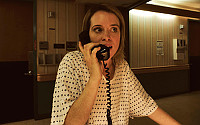| SHADOWS ON THE WALL | REVIEWS | NEWS | FESTIVAL | AWARDS | Q&A | ABOUT | TALKBACK | |||
| Unsane | |||

| |||
|
dir Steven Soderbergh prd Joseph Malloch scr Jonathan Bernstein, James Greer with Claire Foy, Joshua Leonard, Jay Pharoah, Amy Irving, Juno Temple, Raul Castillo, Aimee Mullins, Gibson Frazier, Matt Damon, Sarah Stiles, Polly McKie, Lynda Mauze release US/UK 23.Mar.18 18/US Regency 1h38  Get me out of here: Foy 


BERLIN FILM FEST |
R E V I E W B Y R I C H C L I N E | ||
 Steven Soderbergh tackles the horror genre with this unsettling brain-bender, which plays on audience fears to create a proper freak-out. Anchored by a riveting, full-on performance from Claire Foy, it's a nightmarish trip into a mental hospital that has echoes of One Flew Over the Cuckoo's Nest but is never as high-minded about where it goes. The plot wobbles in the middle, but still delivers some real chills.
Steven Soderbergh tackles the horror genre with this unsettling brain-bender, which plays on audience fears to create a proper freak-out. Anchored by a riveting, full-on performance from Claire Foy, it's a nightmarish trip into a mental hospital that has echoes of One Flew Over the Cuckoo's Nest but is never as high-minded about where it goes. The plot wobbles in the middle, but still delivers some real chills.
After moving from Boston to Pennsylvania to start a new life, Sawyer (Foy) keeps in contact with her concerned mother Angela (Irving), who doesn't know she moved to escape a stalker, David (Leonard). Still feeling paranoid, Sawyer consults a therapist and finds herself committed to a mental hospital for observation. Her manic reaction to this certainly makes her look crazy to roommates Nate, Violet and Jacob (Pharoah, Temple and Castillo). And hospital officials (Mullins and Frazier) are unimpressed with her pleas to be released. Then she becomes convinced that David is one of the orderlies. Shot on iPhones, with fish-eye lenses that augment Sawyer's mix of frustration and fear, the film has a gritty, realistic tone that gets quickly under the skin. This cleverly blurs Sawyer's fragile state of mind, as she becomes unsure about what she's thinking and seeing. This hospital can't be as hellish as it seems. And as she finds a sane ear in Nate, she begins to hope that there will be a sensible way out of here, because it will probably turn out to be nothing more than an insurance scam. Foy lets Sawyer's conflicting thoughts wash across her face, veering in seconds from wryly sardonic to wildly lashing out. It's a big performance that never feels overacted, simply because Foy keeps everything grounded in Sawyer's wavering sense of reality. As a result, she becomes hugely sympathetic, especially in the face of Leonard's smiling, soft-spoken villain. Pharoah and Irving bring intriguing edges to their roles; both are offhanded and authentic. Temple and Mullins, by contrast, are somewhat over-the-top. Sections of the script feel a little obvious. A flashback sequence fills in perhaps a bit too much of Sawyer's back-story. And the final act devolves into a repetitive series of violent horror beats that kind of distract from the much more interesting mental health angle. But through it all, there's an involving sense of the post-traumatic stress that can be induced by stalking, even when nothing particularly violent happened. This makes sure that the events linger after the credits roll.
| |||
| R E A D E R R E V I E W S | |||

 Still waiting for your comments ... don't be shy.
Still waiting for your comments ... don't be shy.
| |||
© 2018 by Rich Cline, Shadows on the Wall HOME | REVIEWS | NEWS | FESTIVAL | AWARDS | Q&A | ABOUT | TALKBACK | |||
